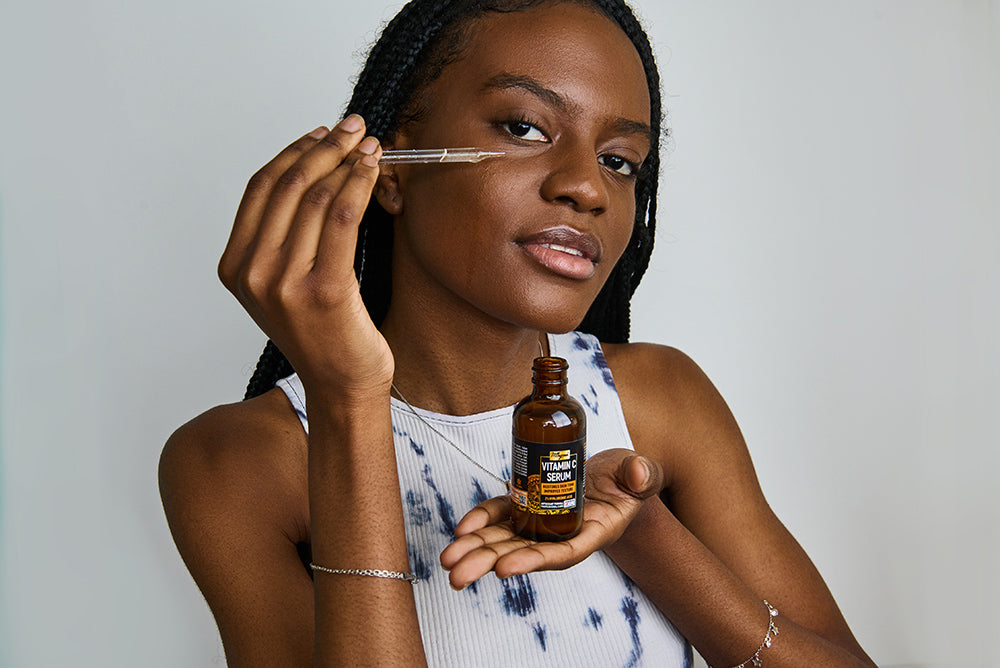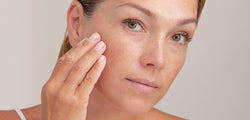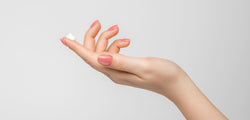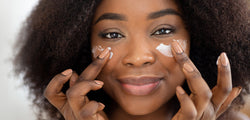
Does Vitamin C Help Acne?
Table of Contents:
Acne vulgaris - the bane of our existence. Do you know that it is estimated that at least 50% of adolescents and approximately 30% of adults in the US experience periodic breakouts? So pervasive and common-place is this skin condition that it has elicited all manner of questions and head-scratching dilemmas such as, "Does vitamin c help acne?" or "Is vitamin c good for acne?" It is especially confusing when one has extremely acne-prone skin or a complexion that tends to flare up every once in a while. Knowing what to use or avoid for your skin can really go a long way in navigating through an industry that is full of solutions, serums, pills and potions that promise to give you that perfect photogenic complexion that rivals the one sported by the girl on the cover of Vogue Magazine.
Does Vitamin C Serum Cause Acne?
Out of the numerous serums that are available for dealing with acne, those that contain vitamin C seem to bear the most fruitful results, and there's a good explanation for that. It also does not come as a surprise that concerns such as, "Is vitamin C good for acne prone skin?" are rarely brought up compared to other zits-combating measures. You see, vitamin C is by itself quite a powerful antioxidant. There's no shortage of anecdotal and observational evidence that bears testimony to ascorbic acid's ability to neutralize fine lines, stimulate collagen production and generally brighten one's complexion.
Having said that, one can't help but wonder does vitamin c serum cause acne or does it help with clearing the breakouts particularly for people who are prone to flare ups. For starters, to clarify the question of whether or not can vitamin C make you break out, it is important to lay bare some of the facts that revolve around ascorbic acid and its effect on one's skin.
1. It Can Aid in the Reduction of Inflammation That is Typically Caused by Acne
All other factors held constant, some of the common risk factors associated with acne are age, genetics, and hormones. Sometimes, the flare up can be triggered by skin bacterium activity, specifically p.acnes. So, can vitamin c make you break out?

On the contrary, no it can not. If anything, ascorbic acid contains a number of anti-inflammatory agents that are considered to be helpful in reducing the swelling or redness that often accompanies a major flare up. These desirable results are typically more pronounced when one uses the vitamin topically via specially-formulated products such as Maryann's Vitamin C serum. In other words, to quell the fears regarding whether or not vitamin c serums cause acne, all indicators show that they can aid in the improvement of acne wounds when used appropriately and strategically.
2. It Can Help Diminish Hyperpigmentation
While there are a lot of myths, unproven facts, half-truths and misconceptions revolving around acne, one thing remains undisputed. Acne has been shown to trigger darkened patches in and around affected areas of one's complexion. These darkened areas are what dermatologists refer to as hyperpigmentation and it can seriously put a dent to one's effort to have clear skin long after an acne attack has fizzled out.
Fortunately, vitamin C has demonstrated a peculiar ability to reduce the conspicuousness of these hyperpigmented patches by masking the effects of tyrosine enzymes. This enzyme, for those who are not familiar with it, is the main enzyme that is usually responsible for melanin production and gives your skin its characteristic tone. In short, this just goes to show how the concerns of whether or not can vitamin c cause breakouts are rather unfounded.
3. It Can Aid in Improving the Appearance of Acne Scars
There's no denying that one's skin can take a minute to heal after full scale acne breakout. And regardless of whether it is a vitamin c serum breakout or not, it goes without saying that it is in your skin's best interests that these scars heal as property and discreetly as possible. Here's where vitamin C serum comes in.
Firstly, there are numerous studies that illustrate how application of vitamin C on one's affected skin patches can help with this by promoting the synthesis of new collagen under the epidermis. Collagen is a protein that is responsible for maintaining your skin's underlying structure and has been linked to healthy skin and faster clearing out of acne scars. In other words, an increased production of collagen would mean that you get to regain a clear skin faster and the acne wounds or lesions will be internally repaired with minimal risk of unsightly scars forming afterwards.

Having dispelled some of the unfounded fears floating around the possibility of a vitamin c breakout, it is only fair to list some of the additional ways application of ascorbic acid can help you dermatologically.
- It can aid in soothing sunburns by accelerating or speeding up the rate of turnover of skin cells. This implies that healthy skin cells will replace damaged ones faster when you are using vitamin C topically compared to other acne-correcting ingredients
- It protects you against the harmful effects of pollution or sun damage by neutralizing the injurious effect of free radicals
- It can help in improving the appearance of under-eye puffiness, swelling or dark circles
- Boosts skin hydration
- By boosting the rate of collagen production, vitamin C can keep your skin from sagging or wrinkling prematurely
Does Vitamin C Serum Cause Purging? What are Some of the Side Effects of Using Ascorbic Acid on Your Skin
As much as most vitamin C serums are generally regarded as safe to use for most people, there are still concerns like does vitamin c serum cause purging? or more specifically, does vitamin c cause purging? Let's see.
To begin, it's important to point out that as much as most serums that contain ascorbic acid are considered to be generally mild, it is vital to perform a patch test before embarking on a full-scale application or adoption of a new product. Essentially, what this does is that it shows you how your skin is likely to react to the application of the serum, which is quite important if you have sensitive skin. Consider it a litmus test of the likelihood-ness of a vitamin c purge even before wading too deep in the unproven waters of a new acne product.

Having said that, vitamin c serum purging is not exactly a bad or harmful thing even in the event that it occurs. Here's the deal; skin purging is simply the elimination of impurities from your epidermis following the acceleration of the rate of skin turnover. In simpler language, it is simply an indication that your skin is shedding dead cells faster than it normally would. Thus, in the process of churning out healthy and fresh skin cells, impurities such as flaky skin, excess sebum and build up of old cells will surface too. This also includes conventional build up that would have otherwise blocked or clogged your skin pores.
In short, the elimination of these would-be impurities is what experts will commonly refer to as skin purging. And unlike conventional acne flare ups, purging will rarely result in scars and will start just a few days or weeks after adopting a new skincare product.
In light of this, one would ask; what then is the difference between an acne breakout and a vitamin c serum purge? Firstly, unlike an acne flare up, skin purging which begins a few days or a week after adopting a vitamin C-based serum occurs uniformly throughout one's face and disappears soon right after. It is, therefore, imperative that you avoid changing or switching up your skincare routine under the guise that it may be worsening rather than improving your symptoms. Instead, you should keep on using it as religiously as possible to increase the odds of the active ingredient penetrating the skin deep enough to extract all offending impurities beneath your epidermis.
In Closing
Now that you are aware that concerns like; can too much vitamin c cause acne are largely unfounded, it is only fair to learn how to tell the difference between skin purging and a bad breakout. Either way, it is still crucial to follow all manufacturer's instructions to the tee to lessen the chances of your skin overreacting to the application of a vitamin C-based serum.













